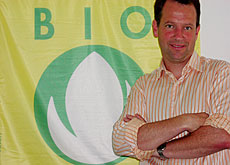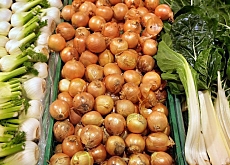Organic sector urged to develop its potential

The new head of the Swiss organic farmers' organisation, Bio Suisse, tells swissinfo the sector needs to take a new approach if it is to reverse a decline in sales.
Markus Arbenz, who took over as director on June 1, said organic producers needed to adapt to changed circumstances, stressing quality over quantity, and marketing their goods better.
The number of organic farms fell last year for the first time and turnover was also slightly down. But the Swiss remain world leaders in the consumption of organic products.
An agronomist and former organic farmer himself, Arbenz previously headed Swiss development projects in Kyrgyzstan and Afghanistan.
swissinfo: You’ve just returned to Switzerland after a number of years in the field in Kyrgyzstan and Afghanistan. What did you learn there that you can apply to this job?
Markus Arbenz: First of all about how to deal with people. We really had to build up institutions, learn how to get on with each other and create rules. It’s the same here although of course the institutions are already established.
Another similarity is the search for solutions, adapted to the conditions in each country, so that people can make a living. What we can learn from them is mainly how to cope with difficulties. They are specialists in making a livelihood in conditions of hardship, and that’s something we have no understanding of here any more.
swissinfo: You’ve now been in the job for more than one month. Presumably you already have some idea of the challenges you face?
M.A.: The organic movement in Europe is very strong and has been developing fast, and Switzerland has always been at the forefront. Now we’re experiencing that the period of fast growth is over. For the farmers this is a new situation and we have to become creative in terms of developing quality and not quantity. And we have to become more active in terms of marketing our products.
We want to have a broad offer and give people the opportunity to consume organic products. Of course organic products are more expensive, because they need more care. But on the other hand this added cost translates into added value for the consumer. And interestingly enough the main consumers are families with children, so those who can afford it least but realise their importance for a balanced diet.
swissinfo: Sales of organic produce dropped last year for the first time. That must be a cause of concern to your members?
M.A.: Absolutely. Especially farmers in remote areas are very worried. And in the milk and meat sectors a lot of farmers are saying they don’t know whether they have a future. At the same time there are moves towards opening markets through the World Trade Organization (WTO) and our relationship with the EU. We are still an island of very high prices and farmers are scared of competition.
What our members want from us is that we really sell their products, explore new markets and new potential, including export potential.
swissinfo: What is the way forward for the organic sector in Switzerland – does the government need to give more backing?
M.A.: If we look at the Swiss constitution, ecology is a high priority, but what is happening now at the level of legislation is that the authorities don’t implement the terms of the constitution as carefully as they should and there is a lot of pressure from lobby groups who say it costs too much money to support ecology.
On the other hand, I don’t think it’s the government’s duty to solve all our problems. What we want is the potential to develop, to export, or bring innovations to the market without having a lot of bureaucracy or customs issues to contend with.
If we consider how production costs have developed in the past 20 years, these have fallen much faster in Switzerland than in any other country. The reasons are structural reforms, reduction of costs for input supplies – for example, seeds – and more efficient marketing.
swissinfo: Are you positive that the decline in sales can be reversed?
M.A.: We are at a critical juncture. But if you look at trends in society they favour organic produce. People want to live longer, they want to live healthily and in an environmentally sustainable way. We are challenged at the moment to communicate the message in such a way that people understand that organic products are part of a healthy lifestyle.
swissinfo: Bio Suisse is 25 years old this year. What are you doing to mark the anniversary?
M.A.: This is a very big event for us and we want to celebrate. On August 18 we are inviting our farmers, producers, consumers and anyone interested to the main square in Bern, in front of the parliament building, for a big party.
The history of organic produce in Switzerland is s a great success story – maybe the greatest success story of Swiss agriculture in the past decade. And we hope we can still say that in another 25 years’ time.
swissinfo-interview: Morven McLean
In 2005 turnover in the organic sector in Switzerland was SFr1.183 billion ($960 million), 0.5% down on the year before.
While sales of fruit, vegetables and eggs increased markedly, those of organic milk and meat declined.
The number of farms run according to Bio Suisse principles – without use of fertilisers and pesticides – fell slightly, to 6,114.
These organic farms account for 11% of all agricultural businesses.
Bio Suisse was founded on September 1, 1981 in Basel.
The association represents 33 organic agriculture organisations.
The Bio Suisse bud symbol certifies that products are organic.
Organic agriculture has been officially recognised in Switzerland since 1998, when the federal organic ordinance came into effect.

In compliance with the JTI standards
More: SWI swissinfo.ch certified by the Journalism Trust Initiative


You can find an overview of ongoing debates with our journalists here. Please join us!
If you want to start a conversation about a topic raised in this article or want to report factual errors, email us at english@swissinfo.ch.